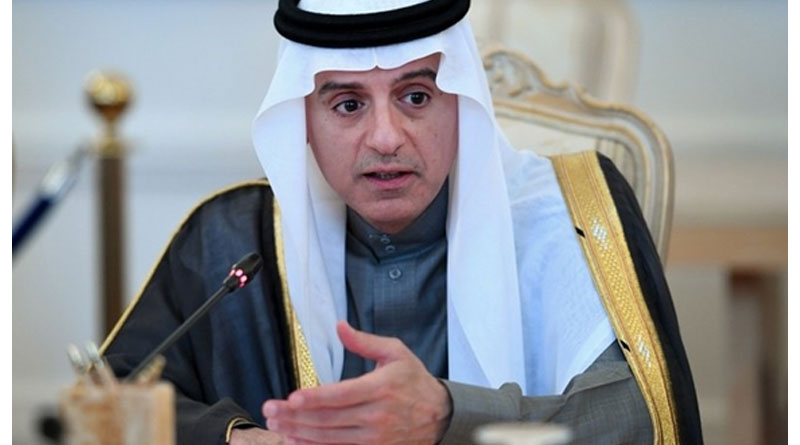Qatar Must Change Its Behaviour or Remain Isolated, Saudi FM Says

Image Caption: Saudi foreign minister Adel Al Jubeir said on June 27, 2017 that Qatar must either change its behaviour or remain isolated by its Gulf neighbours. Kirill Kudryavtsev/ AFP Photo
ABU DHABI // Saudi foreign minister Adel Al Jubeir said Qatar either had to change its behaviour or remain isolated.
In his first public comments since Saudi Arabia, the UAE, Egypt and Bahrain handed over a list of 13 demands to Qatar, Mr Al Jubeir said, “We’ve made our point, we took our steps and it’s up to the Qataris to amend their behaviour. If they don’t they will remain isolated … and if Qatar wants to come back to the GCC fold, it knows what to do.”
Asked if there was risk of pushing Qatar towards Iran, Mr Jubeir said, “With regards to who Qatar deals with, they want to deal with Iran, they can do that at their own peril. I don’t know anyone who has dealt with them and had a positive experience.”
Saudi Arabia was not compelled to “deal with a country that has done harm to us”, the foreign minister added. “They have to change their behaviour and that’s where we are.”
Mr Jubeir was speaking in Washington on his second visit to the US capital in less than two weeks.
He reiterated the decision taken by Saudi Arabia, the UAE, Egypt and Bahrain to isolate Qatar over its support of Islamist and terrorist groups.
“The idea that this is a blockade or a siege is not correct,” he said.
“Qatar’s airports are open, Qatar seaports are open. They just can’t fly over our territory … the idea that we are starving Qataris is not based on facts, they have access to the world, it just costs them a little more, and we said we are prepared to send food and medical supplies.”
However, the funding of terrorist groups, “paying ransom to Shia militias, sending $300 million to Iraq, most of it ending with Quds forces in Iran – this is not acceptable,” he said.
Mr Al Jubeir also applauded Kuwait’s mediation, and said the UAE ambassador to Washington Yousef Al Otaiba is right in describing the demands to Qatar as non-negotiable.
Mr Al Jubeir spoke hours before the US secretary of state Rex Tillerson, who is leading US attempts to mediate between its key GCC partners, met at the state department with his Qatari counterpart, Sheikh Mohammed bin Abdulrahman Al Thani.
The former Exxon CEO, who knows Qatari and other Gulf leaders well, has taken a neutral stance and backed Kuwait-led mediation in the hope of finding a diplomatic solution to the dispute.
After the details of the 13 demands given by Saudi, UAE, Bahrain and Egypt to Qatar, Mr Tillerson said that “while some of the elements will be very difficult for Qatar to meet, there are significant areas which provide a basis for ongoing dialogue leading to resolution”.
He called on the countries to tone down their rhetoric and speak directly and underscored US concerns about the crisis affecting core US interests in the region, saying “we believe our allies and partners are stronger when they are working together towards one goal which we all agree is stopping terrorism and countering extremism. Each country involved has something to contribute”.
With less than a week remaining on the ten-day deadline given to Qatar to meet the demands, UAE’s ambassador to Russia, Omar Ghobash, told the BBC on Tuesday that “Qatar is not responding positively to what we’ve sent”, adding that “I think the whole idea would be to ultimately, simply disengage from Qatar”.
Saudi Arabia’s archrival, Iran, has tried to exploit the intra-GCC crisis and would likely wholeheartedly support the fracturing of the Arab Gulf alliance. Mr Ghobash said such an outcome is an acceptable risk for the UAE. “The idea of it falling into Iran’s lap is something we accept but at least it will provide clarity to the region and we’ll know who our friends and enemies are.”
Washington, for its part, hopes to stave off any dissolution of the GCC bloc.
While Mr Tillerson’s measured approach has been backed by the Pentagon, the White House has supported the isolation measures placed on Qatar. Mr Trump has repeatedly contradicted Mr Tillerson, and his two top Middle East aides, his son in law Jared Kushner and advisor Stephen Bannon, have reportedly pushed for greater support to the Saudi-led effort.
Further complicating the US role in brokering a settlement is the legislative branch of the US government, even as it is controlled by Mr Trump’s Republican party.
The powerful chairman of the Senate foreign relations committee, Bob Corker, moved to back Mr Tillerson’s mediation approach on Monday, writing an unusual public letter to the top diplomat, saying that “recent disputes among the GCC countries only serve to hurt efforts to fight ISIS and counter Iran”, and that he will block “further clearances” for US military sales to the Gulf states until there is a “better understanding of the path to resolve the current dispute and reunify the GCC”.
The hold on sales of lethal arms to the GCC — which totalled $33bn from mid 2015 to mid 2016, according to Defence News — does not apply to sales that have already been notified to Congress, and the White House has the power to override the hold. A joint resolution in both chambers of congress would be required to force a hold.
The ranking Democrat on the committee, Ben Cardin, shared Mr Corker’s concerns.
Mr Tillerson continued his talks with Gulf officials after talks with the Qatari foreign minister, meeting Kuwait’s minister of state for cabinet affairs, Sheikh Mohammed Abdullah Al Sabah, before a working dinner with Kuwait’s ambassador to the US, according to a state department schedule.
(Source: TheNational.ae)



